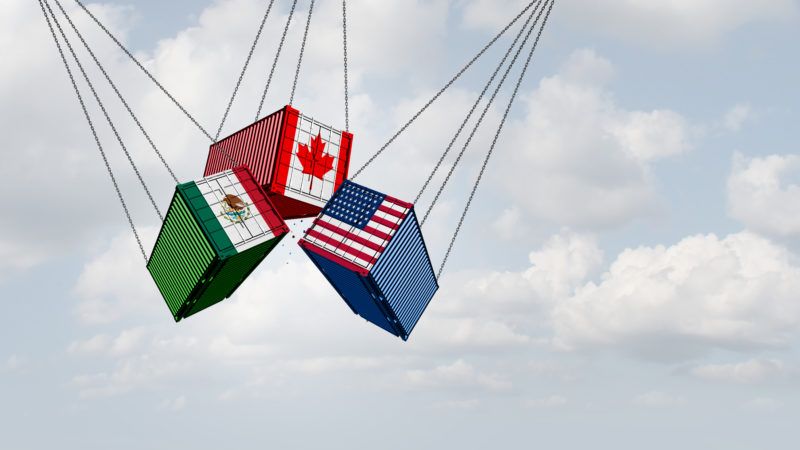3 Things To Know About the 'New NAFTA' That Begins Today
The deal will affect more than $1 trillion in annual trade between the U.S. and its two neighbors.

A little more than 26 years after it ushered in a new era of continent-wide trade, the North American Free Trade Agreement (NAFTA) is no more. Starting today, the United States-Mexico-Canada Agreement (USMCA) takes over.
The new trade deal is the result of more than two years of negotiation among the leaders of the three countries. It is the most substantial accomplishment of President Donald Trump's trade policies, but it also demonstrates the extent to which Trump's unorthodox views on trade have been successfully tempered. After taking office with a vow to tear up NAFTA, Trump ultimately settled for a minor revision to the status quo.
Still, the USMCA is a big deal. Canada and Mexico are the top recipients of U.S. exports. The United States imports more goods from those two countries than anywhere else except China. The deal will affect more than $1 trillion in annual trade between the U.S. and its two neighbors.
Here are three big things to know about the USMCA.
- A small retreat for free trade and a win for protectionism.
Although Trump's supporters sometimes claim that the president is actually pursuing a radical free-trade agenda and only using protectionist tactics to achieve it, the USMCA is strong evidence that Trump would prefer to see more barriers to trade.
For example, the administration pushed for the inclusion of stricter rules that make it more difficult for cars and car parts to cross national borders duty-free. Under the USMCA, 75 percent of the component parts of vehicles would have to be produced in North America to avoid tariffs, and 40 percent would have to be built by workers earning at least $16 an hour—effectively putting a minimum wage on Mexican manufacturing plants with lower wages.
Rather than completely reshaping their supply chains, automobile manufactures are likely to just pay the tariffs. As a result, the International Trade Commission (ITC) estimates that consumer prices on cars in the U.S. will increase, resulting in an estimated 140,000 fewer vehicles sold.
The USMCA also gives Trump (and future presidents) greater powers to impose new tariffs against Canada and Mexico. Already, the Trump administration is looking to do exactly that in response to claims that aluminum imported from Canada have increased this year (even though imports of the metal are still below 2017 levels and well within historical norms). But isn't the point of a trade deal to encourage more trade?
All trade deals are managed trade, of course, but relative to the standards set by NAFTA, the USMCA seems like a step backward.
2. Crucial updates to protect the flow of data across North American borders.
When NAFTA launched in 1994, there were a few dozen websites online. Today there are…a lot more. Importantly, the USMCA includes a new chapter of provisions aimed at digital trade, ensuring that real-world international borders won't start popping up in cyberspace.
For example, the USMCA bans the creation of so-called "data-localization requirements"—rules that limit how much traffic can flow from a data center in one country to servers in another. The new agreement also prohibits tariffs on data transfers, and it includes a provision shielding tech companies from liability for content, similar to the protections offered by Section 230 of the Communications Decency Act.
These are necessary and worthwhile updates to NAFTA that will give businesses more certainty about cross-border digital work.
3. More trade, but also more uncertainty.
The ITC's analysis estimates that the USMCA deal will boost U.S. gross domestic product by about $68 billion while adding an estimated 176,000 jobs in the United States, with the manufacturing sector set to benefit the most. Exports to Canada and Mexico are expected to increase by between 5 and 7 percent.
Then again, NAFTA was a smashing success for the economies of all three countries, and that didn't prevent it from being vilified by elements of both the right and left—both Trump and Sen. Bernie Sanders (I–Vt.) basically agree that NAFTA has been a disaster, despite all evidence to the contrary.
Politics will always be a threat to free trade, but one of the more worrisome elements of the USMCA is that it will expire after 16 years. That creates built-in uncertainty. Jared Kushner, Trump's son-in-law and a key White House adviser, has argued that the trade deal's sunset clause "is not to encourage USMCA's early demise, but to ensure that the agreement will continue to serve America's interests over the long run" by forcing the three countries to return to the negotiating table periodically.
Maybe so, but it also means that we'll have to cross our fingers and hope there aren't protectionist governments in power in Mexico City, Ottawa, or Washington, D.C., in 2036.



Show Comments (37)